death penalty
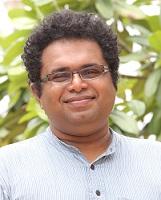 NLU Delhi’s Centre on the Death Penalty, which has produced a considerable number of influential reports and assisted in representing numerous death row prisoners, has widened its focus and re-branded to become Project 39A.
NLU Delhi’s Centre on the Death Penalty, which has produced a considerable number of influential reports and assisted in representing numerous death row prisoners, has widened its focus and re-branded to become Project 39A.
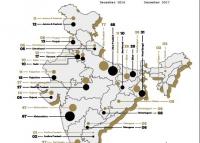 India reversed its trend of death row population spike since last year, with a drop of nearly 27% in the number of prisoners sentenced to death by sessions courts in 2017, according to the second NLU Delhi Death Penalty Report.
India reversed its trend of death row population spike since last year, with a drop of nearly 27% in the number of prisoners sentenced to death by sessions courts in 2017, according to the second NLU Delhi Death Penalty Report.
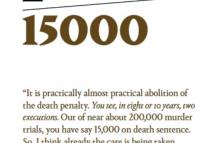 The death penalty would stay on Indian statute books for at least another 50 years, predicted a former Chief Justice of India (CJI) in a wide-ranging study of opinions of former apex court judges conducted by NLU Delhi on the death penalty in India.
The death penalty would stay on Indian statute books for at least another 50 years, predicted a former Chief Justice of India (CJI) in a wide-ranging study of opinions of former apex court judges conducted by NLU Delhi on the death penalty in India.
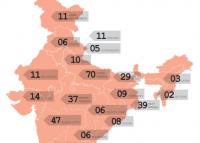 For the first time, NLU Delhi’s Centre on the Death Penalty has analysed death penalties across lower courts and released a report, which suggests a picture in which the judiciary ordering a convict killed seems more subject to randomness than an evolving jurisprudence or overarching policy.
For the first time, NLU Delhi’s Centre on the Death Penalty has analysed death penalties across lower courts and released a report, which suggests a picture in which the judiciary ordering a convict killed seems more subject to randomness than an evolving jurisprudence or overarching policy.
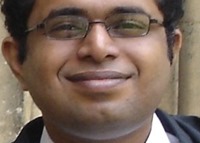 The Supreme Court’s secretary general VSR Avadhani has issued a press release that its former deputy registrar (research), Anup Surendranath, had resigned “on his own request as he wanted to pursue his interest in research projects in which he is involved in”.
The Supreme Court’s secretary general VSR Avadhani has issued a press release that its former deputy registrar (research), Anup Surendranath, had resigned “on his own request as he wanted to pursue his interest in research projects in which he is involved in”.
 “What was played out this week at the Supreme Court was the proverbial final nail,” said Surendranath.
“What was played out this week at the Supreme Court was the proverbial final nail,” said Surendranath.
SCOI Report, Wednesday 29 July 2015: Yakub Abdul Razak Memon vs State of Maharashtra Through the Secretary, Home Department, and Others
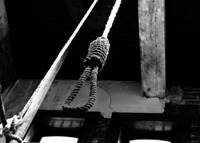 Chief Justice of India (CJI) HL Dattu is not far from matching a new record: since he became CJI on 28 September 2014, he has confirmed the death sentences of 10 persons in five cases.
Chief Justice of India (CJI) HL Dattu is not far from matching a new record: since he became CJI on 28 September 2014, he has confirmed the death sentences of 10 persons in five cases.
NLU Delhi’s nine-month-old death penalty clinic helped death penalty convicts Shabnam and Saleem win relief in the Supreme Court, which quashed their death warrants on Wednesday after having stayed their execution earlier in the week.
The clinic, according to its press release, coordinated the legal representation for Shabnam and Saleem who in 2008 had, together as lovers, murdered Shabnam’s family and were sentenced to death in 2010 by a sessions judge in Amrohi. Their death penalty was later confirmed by the Supreme Court and six days after the confirmation their death warrants were handed down. They had filed criminal appeals before the Supreme Court which dismissed these appeals on 15 May 2015.
Senior advocates Raju Ramachandran and Anand Grover, representing the petitioners in Shabnam v. Union of India & Anr and National Law University, Delhi through Death Penalty Litigation Clinic v. Union of India & Anr, challenged the hasty award of death warrants and, according to the release, “emphasised the importance of adhering to constitutionally compatible procedures when decisions with an irreversible impact on an individual’s life are taken by the State”.
The death warrants were issued before Shabnam and Saleem could file review petitions or curative petitions, for which the law gives them 30 days, reported the Indian Express.
Justices AK Sikri and UU Lalit held that the death warrants were awarded in “undue haste and were unwarranted” and “ignored the legal and constitutional options (open court review petitions and mercy petitions before the Governor of Uttar Pradesh and the President of India) available to [Shabnam and Saleem]”.
The Supreme Court, through this judgment, has laid down a clear procedure for issuing death warrants which can only be issued after all legal and constitutional remedies have been exhausted. The court also noted that even when death warrants are sought principles of natural justice and due process of law cannot be ignored.
NLU Delhi’s death penalty clinic is currently working on the legal representation of around 30 prisoners sentences to death.